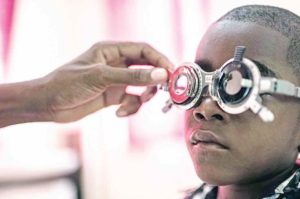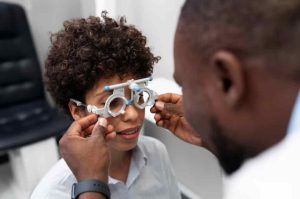The Role of Vision Therapy in Addressing Binocular Vision Disorders in Nigeria
Vision therapy is a form of non-surgical treatment that aims to improve the function and coordination of the eyes, especially in cases of binocular vision disorders. Binocular vision disorders are conditions that affect the ability of the eyes to work together as a team, resulting in symptoms such as double vision, eye strain, headaches, blurred vision, and reduced depth perception. In Nigeria, binocular vision disorders are prevalent among school-aged children and adults, affecting their academic performance, occupational productivity, and quality of life. However, the awareness and availability of vision therapy as a viable option for managing these disorders are limited in the country. This paper explores the role of vision therapy in addressing binocular vision disorders in Nigeria, by reviewing the current literature, highlighting the challenges and opportunities, and providing recommendations for future research and practice.

Understanding Binocular Vision Disorders
Binocular vision disorders refer to a condition where the eyes are unable to coordinate and work together effectively.
These disorders can lead to symptoms such as blurred or double vision, eye strain, headaches, and difficulty focusing.
Understanding the causes and effects of binocular vision disorders is crucial in addressing the issue.
In Nigeria, there is a growing awareness of these disorders, and vision therapy plays a vital role in their treatment.
Common Symptoms of Binocular Vision Disorders
Some of the common symptoms of binocular vision disorders include:
- Blurred or double vision
- Eyestrain
- Headaches
- Difficulty focusing
- Fatigue
- Poor depth perception
Recognizing these symptoms is important in seeking early diagnosis and treatment. Through vision therapy, these symptoms can be alleviated, improving overall visual function.

Diagnosing Binocular Vision Disorders
Diagnosing binocular vision disorders involves a comprehensive eye examination. This examination includes assessing visual acuity, eye alignment, and eye movements. Specialized tests may also be conducted to evaluate binocular vision and depth perception. An accurate diagnosis is crucial in determining the most appropriate treatment, such as vision therapy.
The Importance of Vision Therapy
Vision therapy is a non-surgical and non-invasive treatment approach for binocular vision disorders. It aims to improve the coordination and functioning of the eyes through a variety of exercises and techniques.
The importance of vision therapy lies in its ability to address the root causes of binocular vision disorders. By strengthening the visual system, vision therapy can significantly improve visual skills and overall quality of life.
Vision therapy techniques for binocular vision disorders may include eye exercises, prism lenses, and computer-based activities. These techniques are tailored to the individual’s specific needs and can target issues such as eye alignment and coordination.
The duration and frequency of vision therapy sessions may vary depending on the severity of the disorder. Consistency and commitment to the therapy program are key for optimal results.
Vision Therapy Techniques for Binocular Vision Disorders
Vision therapy techniques for binocular vision disorders may include a variety of interventions aimed at improving the coordination and functioning of the eyes.
Some common techniques used in vision therapy for binocular vision disorders include:
- Eye exercises: These exercises are designed to improve eye muscle control and coordination. They may involve focusing on objects at different distances, tracking moving objects, or performing eye movements in specific patterns.
- Prism lenses: Prism lenses are specialized lenses that can help correct issues with eye alignment or coordination. They work by redirecting light rays to properly align the images seen by each eye.
- Computer-based activities: Vision therapy may incorporate computer-based activities and exercises that target specific visual skills. These activities can help improve eye teaming, tracking, and focusing abilities.
The specific techniques used in vision therapy will depend on the individual’s unique needs and the severity of their binocular vision disorder. A certified vision therapy professional will create a tailored program that addresses the specific issues identified during the diagnostic process.
Consistency and commitment to the vision therapy program are crucial for achieving optimal results. Regularly attending therapy sessions and practicing recommended exercises at home can help individuals make significant improvements in their visual skills and overall quality of life.

Success Stories: Vision Therapy in Nigeria
Vision therapy has shown promising results in addressing binocular vision disorders in Nigeria. Many individuals have experienced improvements in their visual function and quality of life after undergoing vision therapy. These success stories highlight the effectiveness and importance of vision therapy as a treatment option. Through increased awareness and access to vision therapy, more individuals in Nigeria can benefit from its positive outcomes.
Conclusion
In conclusion, vision therapy plays a crucial role in addressing binocular vision disorders in Nigeria. By understanding the causes and effects of these disorders, early diagnosis and treatment can be sought, leading to improved visual function and quality of life. Vision therapy offers a non-surgical and non-invasive approach that targets the root causes of binocular vision disorders through a variety of techniques and exercises. With increased awareness and access to vision therapy, more individuals in Nigeria can benefit from its positive outcomes. It is important for individuals experiencing symptoms of binocular vision disorders to seek professional help and explore the potential benefits of vision therapy.

